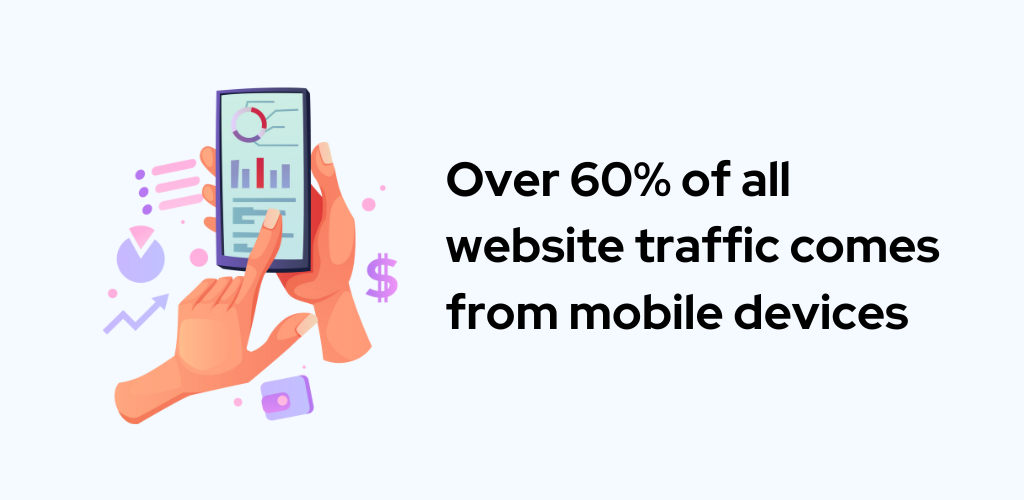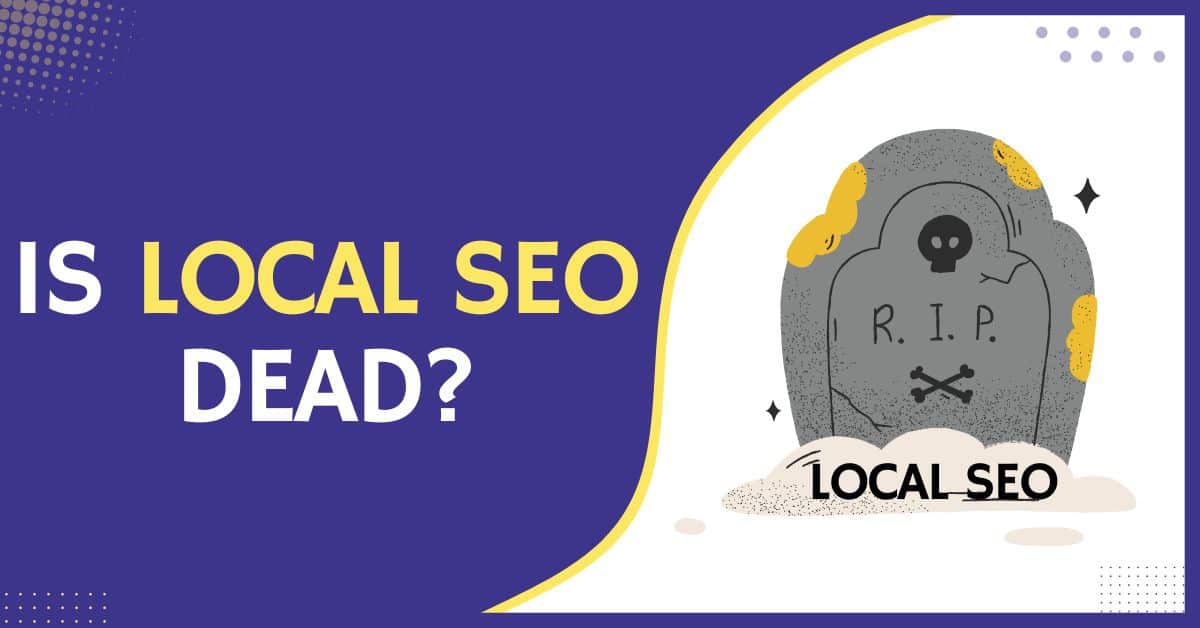Last Updated on 3 weeks by Rabin Rasaili
Let’s face it. Local SEO is not as easy as it was before. New technologies are emerging really fast and user behavior is changing with this. To stay competitive and relevant, search engines are bringing new algorithms to their systems.
With these changing search algorithms, Local SEO has become even harder to tackle. This has led some small business owners to question the relevance of Local SEO;
Is Local SEO dead? Should I continue doing it?
The truth is that local SEO is not dead; it’s just that strategies and best practices have evolved. In fact, the rise of mobile search and voice search has made local SEO even more important, as people are frequently looking for businesses and services in their nearby area.
In this blog post, I’ll show you the increasing importance of local SEO. I will also share different tips on how to adapt your local SEO strategy to stay ahead of the curve and dominate local search results.
So let’s get started.
Key Takeaways
- Local SEO is not dead, but the landscape has changed.
- There are valid concerns about the relevance of traditional SEO tactics in a world of voice search and AI, but local SEO is still important.
- Those who stay informed and adapt to changes continue to benefit from local SEO. The fundamentals remain, but the tactics must evolve.
5 Reasons Why People Say Local SEO Is Dead
First, let’s see some reasons why people argue that local SEO is dead:
- Shift to Paid Advertising: With search engines prioritizing paid ads more in their search results, it seems like organic search results are losing their impact.
- Changes in Search Algorithms: Google constantly updates its algorithms, sometimes making it harder for businesses to maintain their local search rankings.
- Increased Competition: The digital space is crowded, and standing out can be challenging. Some claim that increased competition makes local SEO less viable.
- Rise of Alternative Discovery Methods: Social media, review sites, and mobile apps have become popular ways for consumers to find local businesses.
- Misunderstanding of SEO Evolution: Some businesses fail to recognize that local SEO has evolved alongside search engine updates and user behavior changes.
Increasing Importance of Local SEO in 2024 & Beyond
Regardless of what people say, local SEO is definitely not dead. It’s actually growing with more and more consumers relying on mobile devices and voice search to find local businesses.
Having a strong local SEO strategy is no longer just a nice-to-have – it’s an absolute necessity.
1. Growing Dominance of Mobile Search on Local Search
The dominance of mobile search has been one of the biggest driving forces behind the increasing importance of local SEO. With more and more people using mobile devices to search the internet, the number of local searches has skyrocketed.

Most importantly, when searching on a mobile device, users are much more likely to have local intent – looking for businesses, services, or other things near their current location.
- 58% of people use their smartphones to search for a local business every day.
- Google reports that “near me” mobile searches have grown by over 500% in recent years.
This means that businesses must ensure that their website is mobile-friendly, loads quickly, and provides a seamless user experience on smaller screens to capitalize on this growing mobile search trend.
2. Google’s Emphasis on Local Search Results and the Prominence of Google My Business
Google has been placing more emphasis on local search results in recent years.
For this, Google has prioritized indexing the mobile version of a website when deciding how to rank them. And emphasized more on user experience, especially for localized searches where user intent is finding nearby convenient options.
Additionally, they have given significant prominence to the Google My Business listings, often showing the local map pack and top GMB listings before organic results. Having an optimized, complete Google My Business profile is essential for local ranking.
3. Growing use of Voice Search and Virtual Assistants
Did you know?
50% of U.S. consumers utilize voice search on a daily basis.
Voice search is becoming increasingly popular, with more and more people using virtual assistants like Siri and Alexa to find local businesses. Instead of typing queries into a search engine, users are now speaking their searches out loud, often in a conversational tone.
For eg: “Mexican restaurants near me” or “Best pizza shop near me”.
This shift towards voice search has made it even more critical for businesses to optimize their online presence for local search intent.
Key Strategies to Keep Your Local SEO Effective in 2024
1. Claim your GMB profile
Make sure you claim and verify your Google My Business (GMB) profile. This free listing allows you to provide accurate information about your business, such as your address, phone number, website, and operating hours.
By claiming your GMB profile, you can improve your visibility in local search results and make it easier for potential customers to find and contact you. Remember, an active GMB profile signals to Google that your business is alive and kicking.
2. Accurate Business Information
Make sure your business details are correct everywhere online. This means your name, address, and phone number (NAP) should be the same on your website, social media, and business directories. If you move or change your phone number, update it everywhere.
Consistency tells search engines your business is legit and helps customers find you easily. Double-check your info on popular sites like Yelp, Facebook, and industry-specific directories.
Accurate information builds trust with both search engines and potential customers.
3. Focus on Mobile-First Indexing
Most people now use phones to search online, so make your website mobile-friendly. This means it should look good and work well on small screens.
Use large, readable text and buttons that are easy to tap. Make sure your site loads quickly on mobile devices. Put important information like your contact details and business hours near the top of the page.
Google now primarily uses the mobile version of your site for ranking, so a mobile-friendly website can significantly boost your search visibility.
4. Create Location-Specific Content
Write content that speaks directly to your local audience. Mention local landmarks, events, or news in your blog posts or website pages.
Create separate pages for each location if you have multiple branches. Use local keywords naturally in your content, like “best pizza in [your city].”
Share information about local partnerships or community involvement. This shows search engines and potential customers that you’re an active part of the local scene.
Location-specific content helps you appear in “near me” searches and attracts customers looking for local businesses.
5. Optimize for Voice Search and Conversational Queries
More people are using voice assistants like Siri or Alexa to search. They tend to ask full questions rather than using short keywords.
To optimize for this, think about how people speak. Use natural language in your content and include question-and-answer formats.
Focus on long-tail keywords that sound like real questions, such as “Where can I find the best coffee in downtown?” Create FAQ pages that address common queries about your business or industry.
Also, ensure your local business information is accurate and easily accessible, as voice searches often look for quick, direct answers to location-based queries.
6. Build Local Citations
Local citations are mentions of your business name, address, and phone number on other websites. These could be business directories, local chamber of commerce sites, or industry-specific platforms.
Consistently list your business information across these sites. This helps search engines verify your business’s legitimacy and improves your local search rankings.
Start with major platforms like Yelp, Yellow Pages, and TripAdvisor, then move on to local and industry-specific directories. Focus on reputable and relevant directories, and ensure that your information is consistent across all platforms.
7. Encourage and Respond to Reviews
Reviews are crucial for local SEO. They show search engines that your business is active and trusted.
Encourage happy customers to leave reviews on your Google My Business profile and other platforms. Make it easy by providing direct links to your review pages.
Always respond to reviews, both positive and negative. Thank positive reviewers and professionally address concerns in negative reviews. This shows you value customer feedback and are committed to customer service.
Remember, authentic reviews from real customers are best, so avoid buying fake reviews as this can harm your online reputation.
Future Trends in Local SEO
As technology continues to evolve, so do the trends in local search. Here are some of the future trends that are likely to shape the local search landscape:
1. The Rise of Voice Search
With the increasing popularity of voice assistants like Amazon’s Alexa and Google Assistant, voice search is becoming more and more prevalent. A study reports that 58.6% of US consumers have used voice search at least once. This trend is expected to continue to grow in the coming years.
As a result, businesses will need to optimize their local SEO strategies to accommodate voice search queries. This means focusing on long-tail keywords and natural language phrases that people are likely to use when speaking to their voice assistants.
2. Mobile-First Indexing
With the majority of internet searches now being conducted on mobile devices, Google has shifted its focus to mobile-first indexing. This means that Google now uses the mobile version of a website as its primary index, rather than the desktop version.
As a result, businesses will need to ensure that their websites are mobile-friendly and optimized for mobile search. This includes using responsive design, optimizing page load times, and ensuring that all content is easily accessible on mobile devices.
3. Personalized Search Results
As search engines become more sophisticated, they are able to provide more personalized search results based on a user’s search history, location, and other factors. This means that businesses will need to focus on creating content that is relevant and engaging to their target audience.
To do this, businesses can use tools like Google Analytics to gain insights into their audience’s search behavior and preferences. They can then use this information to create content that is tailored to their audience’s needs and interests.
Final Words-Is Local SEO Dead in 2024?
Definitely not! Local SEO is still alive and in fact more important than ever due to the increasing demand for local products and services.
While it is true that the landscape of local search has changed dramatically over the years, it is still a critical component for local businesses to effectively reach and attract customers in their geographic area.
Learn more: Local SEO for Small Businesses: Must-Know Strategies in 2024
FAQs
Does local SEO still work?
Yes, local SEO continues to be effective in 2024. It helps businesses appear in local search results, making them more visible to nearby customers. With the increasing use of mobile devices for local searches, local SEO remains a powerful tool for attracting local customers.
Is doing a local SEO worth it?
Absolutely. Local SEO is a cost-effective way to reach potential customers in your area. It improves your visibility in local search results, helps you compete with larger businesses, and can significantly increase foot traffic and online inquiries from local customers.
Is SEO dying in 2024?
No, SEO isn’t dying. It’s evolving. While tactics change, the core principle of optimizing for search engines remains crucial. As long as people use search engines to find information and services, SEO will continue to be vital for online visibility and business growth.
What is the future of local SEO?
The future of local SEO involves more personalized, location-based experiences. Voice search optimization, mobile-first strategies, and integration with emerging technologies like augmented reality are likely to become increasingly important. Local SEO will focus more on user intent and providing hyper-relevant local content.

Rabin is an enthusiastic SEO and a content creator who is also a BCA graduate. He shares easy-to-follow hacks and tips to help you make smart choices for SEO tools and strategies through his blog. Passionate about learning and sharing, Rabin’s goal is to help you navigate your SEO and blogging journey with confidence.
